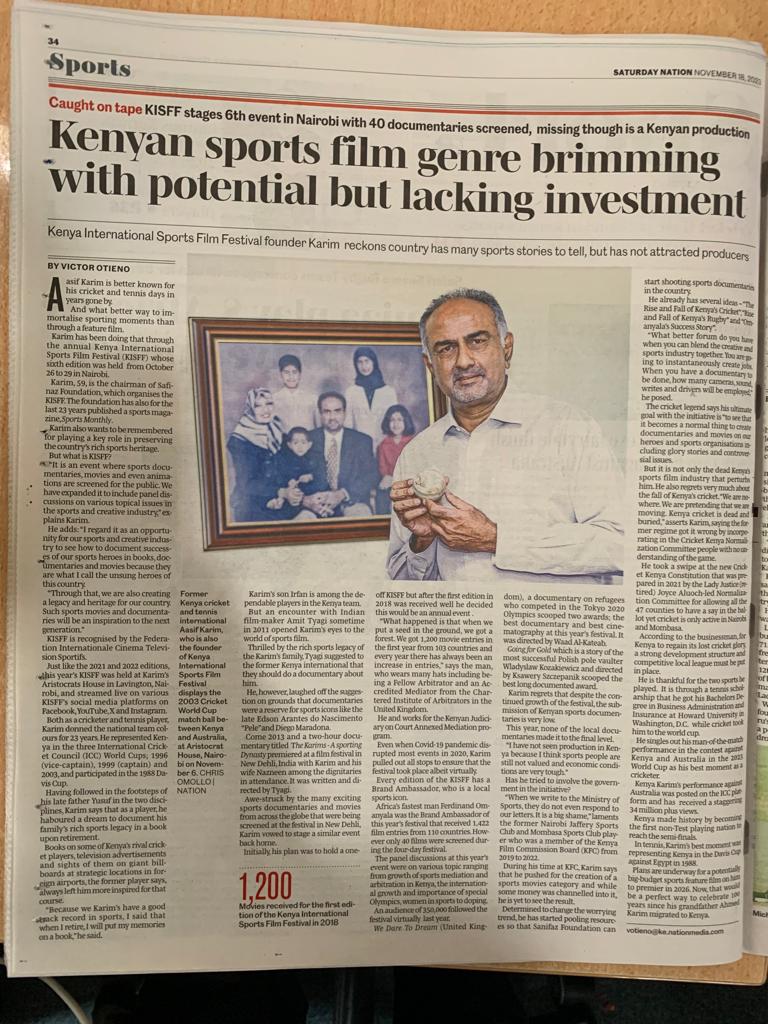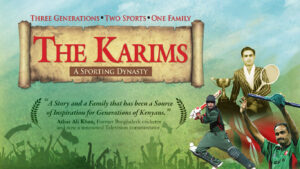Aasif Karim is better known for his cricket and tennis days in years gone by.
And what a better way to immortalise sporting moments than through a feature film.
Karim has been doing that through the annual Kenya International Sports Film Festival (KISFF) whose sixth edition was held from October 26 to 29 in Nairobi.
Karim, 59, is the chairman of Safinaz Foundation, which organises the KISFF. The foundation has also for the last 23 years consistently published a sports magazine titled Sports Monthly.
He also wants to be remembered for playing a key role in preserving the country’s rich sports heritage.
But what is KISFF?
 “It is an event where documentaries, movies and even animations on sports are screened for the public. We have expanded it to include panel discussions on various topical issues in the sports and creative industry,” explains Karim.
“It is an event where documentaries, movies and even animations on sports are screened for the public. We have expanded it to include panel discussions on various topical issues in the sports and creative industry,” explains Karim.
He adds: “I regard it as an opportunity for our sports and creative industry to see how to document our sports heroes in books, documentaries and movies because they are what I call the unsung heroes of this country.”
“Through that (documenting Kenya’s sports heroes), we are also creating a legacy and heritage for our country. Such sports movies and documentaries will be an inspiration to the next generation.”
KISFF is recognised by the Federation Internationale Cinema Television Sportifs.
Similar to the 2021 and 2022 editions, this year’s KISFF was physically held at Karim’s Aristocrats House in Lavington, Nairobi, while virtually, it was streamed live on various KISFF’s social media platforms which included Facebook, YouTube, X (formerly twitter) and Instagram.
Both as a cricketer and tennis player, Karim donned the national team colours for a massive 23 years. He represented Kenya in the three International Cricket Council (ICC) World Cups; 1996 (vice-captain), 1999 (captain) and 2003 and participated in the 1988 Davis Cup.
Having followed in the footsteps of his late father Yusuf in the two disciplines, Karim says that as a player, he haboured a dream to document his family’s rich sports legacy in a book upon retirement.
Books on some of Kenya’s rival cricket players, television advertisements and sights of them on giant billboards at strategic locations in foreign airports, the former player says, always left him more inspired for that course.
“Because we (Karim’s family) have a good track record (in sports), I said that when I retire, I will put my memories on a book,” narrates Karim, whose son Irfan is currently among the dependable players in the Kenya national men’s senior cricket team.
But an encounter with Indian film-maker Amit Tyagi sometime in 2011opened Karim’s eyes to the world of sports film.
Thrilled by the rich sports legacy of the Karim’s family, Tyagi suggested to the former Kenya international that they should do a documentary about him. He, however, laughed off the suggestion on grounds that documentaries were a reserve for sports icons like the late Edson Arantes do Nascimento “Pele” and Diego Maradona. “My immediate reaction was a big laughter. I said what do you mean by a documentary? It is not for us but the likes of Pele and Maradona,” he narrates. Come 2013 and a two-hour documentary titled – The Karims – A sporting Dynasty premiered at a film festival in New Dehli, India with Karim and his wife Nazneen among the dignitaries in attendance. It was written and directed by Tyagi.
Awe-struck by the many exciting sports documentaries and movies from across the globe that were being screened at the festival in New Dehli, Karim vowed to stage a similar event back home.
Initially, his plan was to hold a one-off KISFF but after the first edition in 2018 received a lot of excitement, it motivated him to make it an annual event. “What happened is that when we put a seed in the ground, we got a forest. We got 1200 movie entries in the first year from 103 countries and every year there has always been an increase in entries,” says the man, who wears many hats including being a Fellow Arbitrator and a Accredited Mediator from the Chartered Institute of Arbitrators in the United Kingdom and works for the Kenyan Judiciary on Court Annexed Mediation program.
Even when Covid-19 pandemic disrupted most events in 2020, Karim pulled out all stops to ensure that the festival took place but virtually.
Every edition of the KISFF has a Brand Ambassador who is a local sports icon.
Africa’s fastest man Ferdinand Omanyala was the Brand Ambassador of this year’s festival that received a total of 1,422 film entries from 110 countries with only about 40 being screened during the four-day event.
The panel discussions at this year’s event were on various topic including: Growth of Sports Mediation and Arbitration in Kenya, the International Growth and Importance of Special Olympics, Women in Sports, Sports in Films and Doping.
The panelists who include local and international experts are always selected and invited to share their experience during such panel discussions or interviews.
Virtually, the 2022 festival had a following of over 350,000.
To ensure that only the best sports related films are screened at KISFF, there is a three-layer jury that has been tasked with the selection. Karim regrets that despite the continued growth of the festival, the submission of Kenyan sports documentaries is very low.
This year, none of the local documentaries made it to the final level.
“Unfortunately, over the six years, the festival has failed in waking up the creative industry to do sports documentaries,” says the former player with disappointment written all over his face.
“There are many who follow, some come and watch but I have not seen production in Kenya because I think sports people are still not valued and economic conditions are very tough.”
But has he tried to involve the government in the initiative?
“When we write to the Ministry of Sports, they do not even respond to our letters. It is a big shame,” laments the former Nairobi Jaffery Sports Club and Mombasa Sports Club player who was a member of the Kenya Film Commission Board (KFC) from 2019 to 2022.
During his time at KFC, Karim says that he pushed for the creation of a sports movies category and while some money was channeled into it, he is yet to see the result.
Determined to change the worrying trend, he has started pooling resources so that Sanifaz Foundation can in the near future start shooting sports documentaries in the country.
He already has several ideas in mind including; The Rise and Fall of Kenya’s Cricket, Rise and Fall of Kenya’s Rugby and Omanyala’s Success Story. “What better forum do you have when you can blend the creative and sports industry together. You are going to instantaneously create jobs. When you have a documentary to be done, how many cameras, sound, writes and drivers will be employed?” he posed of the other benefits of a vibrant sports film industry in the country.
The legend says his ultimate goal with the initiative is “to see that it becomes a normal thing to create documentaries and movies on our heroes and sports organisations including controversial issues not only glory.”
But it is not only the dead Kenya’s sports film industry that perturbs him. He also regrets very much about the fall of Kenya’s cricket. “We are nowhere, we are pretending that we are moving. Kenya cricket is dead and buried,” asserts Karim, saying the former regime got it wrong by incorporating in the Cricket Kenya Normalization Committee people with no understanding of the game.
He took a swipe at the new Cricket Kenya Constitution that was prepared in 2021 by the Lady Justice (retired) Joyce Aluoch-led Nomalization Committee for allowing all the 47 counties to have a say in the ballot yet cricket is only active in Nairobi and Mombasa.
He is of the view that counties where cricket is not active ought to have been represented in a different way, for instance as an associate member with a given timeline to make the sport active in their respective counties before being recognized as full members.
According to the businessman, for Kenya to regain its lost cricket glory, a strong development structure and competitive local league must be put in place. “In any sport, you must have a solid development structure meaning you have under 11, 13 ,15 and 17 categories because the Tikolo’s and Odumbe in cricket will be long gone then what is coming through. We also need a very strong domestic competition meaning there is a strong interest by members of that club,” he recommends.
“We need competent administrators in all sports orginisations that are qualified to run an effective sports organisation.”
He is happy to have played the two sports since it is through a tennis scholarship that he got his Bachelors Degree in Business Administration and Insurance at Howard University in Washington, D.C. in the United States of America while cricket took him to the world cup.
He singles out his man-of-the-match performance in the contest against Kenya and Australia in the 2023 World Cup as his best moment as a cricketer.
The event was co-hosted by South Africa, Zimbabwe and Kenya.
Kenya Karim’s performance against Australia was posted on the ICC platform and it received a staggering 34 million plus views.
At the competition, Kenya shocked many by reaching the semi-finals where they lost by 91 runs to India.
It remains Kenya’s best cricket performance in history.
In tennis, Karim’s best moment was representing Kenya in the Davis Cup against Egypt in 1988.
If everything goes to plan, 2026 will be a memorable year for the Kenyan legend since there is an ongoing discussion locally and internationally for a potentially big budget feature film on him to premier then.
He hopes that the project becomes a reality since it will be a perfect way to celebrate 100 years since his grandfather Ahmed Karim migrated to Kenya.
BY VICTOR OTIENO
votieno@ke.nationmedia.com









